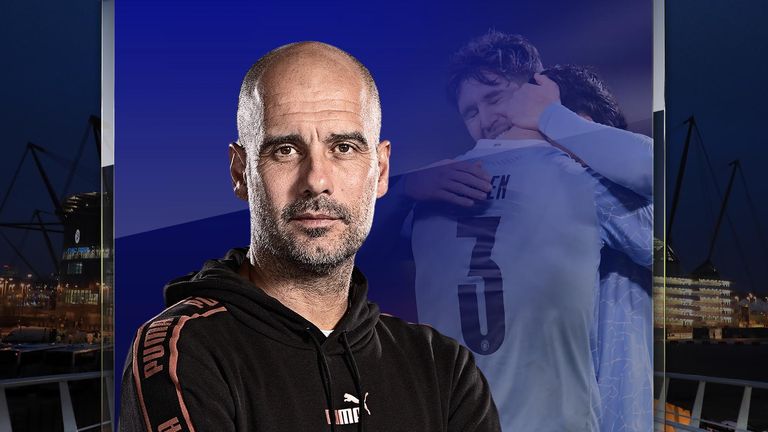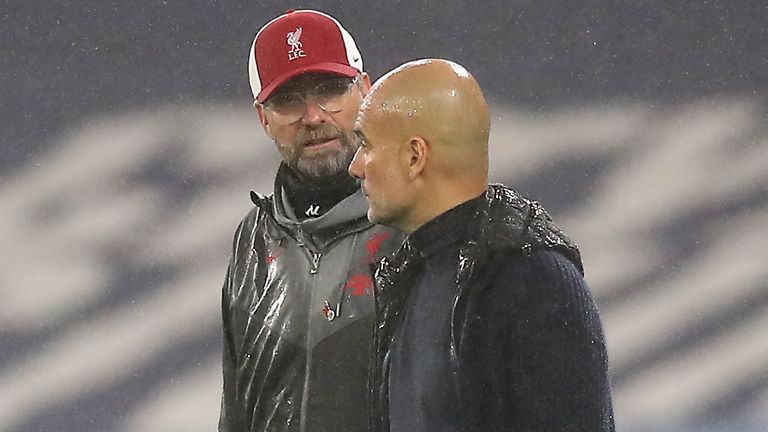Pep Guardiola exclusive interview: Possession football is the secret of Man City's defensive success
In an exclusive interview with Sky Sports, Pep Guardiola argues that it is his commitment to possession that has been the key to his team's defensive record. Watch Liverpool vs Manchester City live on Sky Sports Premier League and Sky Sports Main Event from 4pm on Sunday; kick-off 4.30pm
Sunday 7 February 2021 17:18, UK
It is towards the end of the interview that Pep Guardiola starts to become animated. "Football is not A, B and C," he explains. "What works last season will not necessarily work this season. What did not work last season, could work now. It is open, it is moving, it is like an animal, it develops. Sometimes it moves this way, sometimes it moves another way."
He is discussing football in the pandemic and his own attempts to figure it out. Despite Manchester City's record run of 13 wins in a row, Guardiola stops well short of saying he has solved it - a sensible move given that he takes his team to Anfield to face Liverpool this Sunday. But City have clearly re-established themselves as English football's team to beat.
Their defensive record has been at the core of their upsurge in form, conceding only once in their last nine Premier League matches. Even that was a late consolation at Chelsea with the game long since won. It is strange to think that Frank Lampard's side began that January afternoon level on points with Manchester City. They have been relentless ever since.
So imperious has been City's form that it feels natural to ask what has changed but Guardiola prefers to see this success as a continuation of years of work. The statistics suggest they are pressing a little less than before, staying in shape and playing a positional game. He rejects that idea. "We are still playing 60 metres in front of our goal," he insists.
Perhaps he has tried to close off the middle of the pitch more, then. Benjamin Mendy's only starts since autumn have come at home to Burnley, Fulham and West Brom. In the trickier looking matches, City have opted to move the full-backs inside instead, making it more difficult to burst through as Leicester and Leeds did in those chaotic early-season matches.
"Sometimes we play outside, sometimes we play inside," he says. "It depends on the opponents. But the reason why is to play better, not to defend better. It is to play better."
The conversation takes place at the end of Guardiola's media duties in preparation for his team's showdown with the champions. He has fielded a series of questions about Jurgen Klopp following the Liverpool manager's spiky remarks about City in the build-up.
Meanwhile, the culture clash of a contest between Tottenham and Chelsea the previous evening, along with Marcelo Bielsa's claim that afternoon that he would rather be in the bottom half than finish eighth but not play well, have put issues of style back on the agenda.
Maybe that is why it feels like a good time for Guardiola to double down on his principles.
"The reason why [our defensive record is so good] is because 67 per cent of the time we have the ball," he explains. "This is the main reason. The main reason is that we have the ball. If you have the ball as much as possible then the opponent does not have the ball.
"Of course, the opponent can score from set pieces or a counter-attack but the more that you have the ball the more chances you will have to score a goal. This is the reason why.
"Maybe one day they will change the rules but I think to score a goal you need the ball."
Guardiola is speaking from a position of strength again and one is reminded that his Barcelona team had the best defensive record in Spain for all three of his title wins there. History repeated itself when he won a trio of titles with Bayern Munich in Germany. Examine his record. He is arguably the greatest defensive manager of all-time.
"You cannot win the titles, especially the titles of the Premier League and the Bundesliga, if you concede a lot of goals," he says. "Last season we conceded more than usual and we didn't adjust well to some things. But if you look at the goals that we conceded in all of our years here in Manchester, in Munich, in Barcelona, it was always few. Few, few, few.
"And we did it playing 50 or 60 metres in front of our goal, and always we were stable defensively. Absolutely, I do not want to concede goals. And I want to score a lot. That is what we are working for with good quality players who want to have the ball."
Despite his initial protestations, there is an acknowledgement in there that something has changed at City. They are surrendering fewer big chances to the opponent than at any point in his reign, managing those fast breaks better than before. His team have not conceded on the breakaway since the defeat to Tottenham in November. They are unbeaten since.
"It is important. When you played 60 metres away from your goal then the controlling the counter-attack is important. Sometimes it is not possible because of the opposition players, but if you use the ball well and do not make mistakes, you will concede few."
The mention of mistakes highlights another crucial shift. "It is the reason why we concede so few. The back four, no matter who plays, they are so solid. They do not make mistakes."
City are making fewer errors leading to shots than in any of their previous four seasons under Guardiola. It is a product of individual and collective improvement. Certainly, the arrival of Ruben Dias at centre-back has been key with the Portuguese having the same game-changing influence on those around him that Virgil van Dijk had at Liverpool.
"Basically, he talks to them during the game," explains Guardiola. "He anticipates. He does not play the game for himself, he looks what happens in front of him and behind him."
All of which means that Manchester City go to Anfield full of confidence, believing in their work. But Guardiola has never won there. The players have more bad memories than good.
"For sure, but if we just think about this then we are going to forget to play. And when you forget to play you just adapt to what the other team are. Of course, they are such a dangerous team but I am concerned about what we are going to do."
And what Guardiola is going to do, will never change.
"I want to go into every single game reminding the players why they became football players and that is to play with the ball. It is a stupid thing, a simple thing, whatever you want to say. But I organise my teams from day one until today in this way.
"We try to do it in a certain way. Basically, we want the ball."
- How do Liverpool and Man City styles compare?
- Guardiola responds to Klopp's City comments
- Get Sky Sports | Get NOW TV - save more than 25%
Football is an animal, it moves, adapts, and Guardiola intends to adapt with it. But the principles will not change. The song remains the same and the tune he is getting from his City players looks likely to bring a third Premier League title in four seasons.
"The important thing is the results," he concludes before adding the caveat. "And your principles, your fundamentals as a manager. The way you believe is best has to remain the same to help this organisation - Manchester City - become the best club possible."







